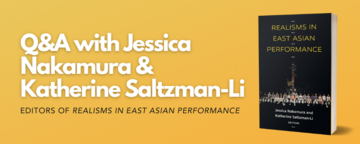Celebrate National Hispanic Heritage Month with UMP!

September 15th began Hispanic Heritage Month! This month, which goes through October 15th, celebrates the histories, cultures, and contributions of hispanic communities and their members. September 15th is significant because it marks the anniversary of independence day for many Latin American countries, including Costa Rica, El Salvador, Guatemala, Nicaragua, and Honduras. Mexico and Chile also celebrate their independence days that week.
Hispanic Heritage Month offers many opportunities to learn more about Hispanic culture, artists, authors, traditions, and more! For more information, as well as exhibits, collections, and community resources, click here.
Throughout this month, The University of Michigan Press is highlighting some of our most relevant titles.
Translocas: The Politics of Puerto Rican Drag and Trans Performance by Lawrence La Fountain-Stokes
Translocas focuses on drag, transgender performance, and activism in Puerto Rico and its diaspora. Author Lawrence La Fountain-Stokes, a drag performer himself, explores social and cultural disruptions that are caused by Latinx "locas," (a group which is typically defined as effeminate men, drag queens, trans performers, and unruly women). This award-winning book invites readers to challenge, question, and expand their knowledge of queer life, drag, trans performance, and Puerto Rican identity.
Latinx Shakespeares: Staging U.S. Intracultural Theater by Carla Della Gatta
Latinx people and cultures have been incorporated into Shakespearean performance in the US for more than 75 years, but has gone largely overlooked in Shakespeare studies as a whole. In Latinx Shakespeares, Carla Della Gatta argues that theater makers and historians need to acknowledge the presence and influence of Latino communities on American Shakespeare. This book investigates the history of dramaturgy and language in more than 140 Latinx-themed Shakespearean productions in the US. It offers a new method to study ethnic theater, and beyond visual aspects it explores music, accents, and the Spanish language.
The focus of this book is on textual adaptations or performances in which the characters, stories, or plays themselves are made Latinx through stage techniques, aesthetics, casting, storytelling, and other art-making techniques. Latinx Shakespeares moves toward reclaiming Shakespeare as a borrower, adaptor, and creator of language that is all too often used only in the cultural specificity of the English language, and whiteness.
Latin Numbers: Playing Latino in Twentieth-Century U.S. Popular Performance by Brian Eugenio Herrera
Latin Numbers explores how popular performance originating from Latino culture has led American audiences to view Latinos as a distinct (and distinctly non-white) ethnic group. This book is a work of performance history that examines the way Latino actors from stage and screen influenced American ideas about race and ethnicity.
It explores how these performances, specifically those from the twentieth century, contributed to the popular American understanding of Latinos as a distinct racial and ethnic group. Herrera combines a flair for storytelling and analysis of pop culture that will appeal to a wide variety of audiences. Latin Numbers delights readers with many memorable, and often lesser known, Latino performances on stage and screen.
¡Muy Pop! Conversations on Latino Popular Culture by Frederick Luis Aldama & Ilan Stavans
Although Hispanic popular culture has been investigated for decades as an aspect of folklore studies, these studies have been lacking a broader conversation that offers a unique context for these studies, surrounding questions like "what is Hispanic pop culture?" "how does it change over time, and in different regions?" "Does it make sense to approach the whole Hispanic world as Homogenized when understanding Hispanic pop culture?" and many more.
In ¡Muy Pop! authors Ilan Stavans and Fredrick Luis Aldama carry a sustained, free-flowing conversation about these questions, and shed light on the making and consuming of Hispanic pop culture for academics, specialists, and mainstream critics.
From Inclusion to Influence: Latino Representation in Congress and Latino Political Incorporation in America by Walter Clark Wilson
In From Inclusion to Influence, Walter Wilson addresses urgent questions regarding the political incorporation of Latinos in America. He shows that Latino representatives in congress more accurately represent Latino interests, both by connecting Latino communities to government, and by bringing their concerns into the legislative process.
He also identifies ways that the efforts of Latinos in congress open the door for meaningful inclusion of Latinos in politics, and creates space for Latinos to shape public policy and promote democracy in an increasingly diverse nation.
None of the Above: Protest Voting in Latin American Democracies by Mollie J. Cohen
Around the world every year, millions of citizens show up to vote, but leave their ballots empty, or spoil them. Additionally, a number of campaigns have emerged that promote invalid votes. None of the Above explores these questions using evidence from the presidential and smaller scale elections from eighteen Latin American democracies.
Contrary to popular belief, None of the Above demonstrates that most citizens cast blank or spoiled votes on purpose. By participating in invalid vote campaigns, citizens can express concerns about low quality candidates, and a preference for high-quality democracy. These campaigns tend to be especially successful when the incumbent politicians undermine the quality of elections. And surprisingly, these campaigns can help with the upkeep of democracy, at least in the short term. This book demonstrates that swings in blank and spoiled vote rates can serve as a warning about the trajectory of a country's democracy.
Chicano Novels and the Politics of Form: Race, Class, and Reification by Marcial Gonzales
Since the 1990s, the field of Mexican American fiction has grown drastically. However, there has been relatively minimal critical assessment of this rapidly flourishing section of American literature. Chicano Novels and the Politics of Form works to study the literary form that focuses on the fiction of four main authors: María Amparo Ruiz de Burton, Oscar Zeta Acosta, Danny Santiago, and Cecile Pineda.
This book demonstrates the relationship between politics and form in the novel, a topic that has long intrigued literary scholars. This book is a timely, provocative, and original study that will appeal to scholars and students of American literature, ethnic studies, Latino studies, critical race theory, and Marxist literary theory.
Performing Queer Latinidad: Dance, Sexuality, Politics by Ramon H. Rivera-Servera
Performing Queer Latinidad highlights the essential role that performance has played in the development of Latina/o queer public culture in the U.S. since the 1990s and early 2000s. In this period, the size and influence of Latina/o population was growing, but so was scrutiny of the public spaces where Latinidad could spread and be accepted.
At a time when latinidad reached the national public sphere, and Latina/o space was increasingly threatened by gentrification and anti-immigration ideology, queer Latinas/os returned to performance to claim spaces that allowed their queerness and latinidad to coexist. These social events and performances served as critical sites and tactics for creating and protecting queer latinidad.
Inhabiting the Impossible: Dance and Experimentation in Puerto Rico by Susan Homar and nibia pastrana santiago
Inhabiting the Impossible is a first-of-its-kind book that brings together writing by artists and scholars alike, to survey the field of Puerto Rican experimental dance across forty years. Originally published as Habitar Lo Impossible, this English translation features essays, artist statements, and interviews. It also includes more than 100 photos of productions programs, posters, and scores.
This book provides fresh, invaluable perspectives on experimentation in the world of dance, as a long-term practice that has always deeply engaged topics of race, gender, sexuality, and politics.
This post was written by Elena Mills, a sophomore student at the University of Michigan. She is pursuing a double major in Arts and the Ideas in the Humanities and English.











